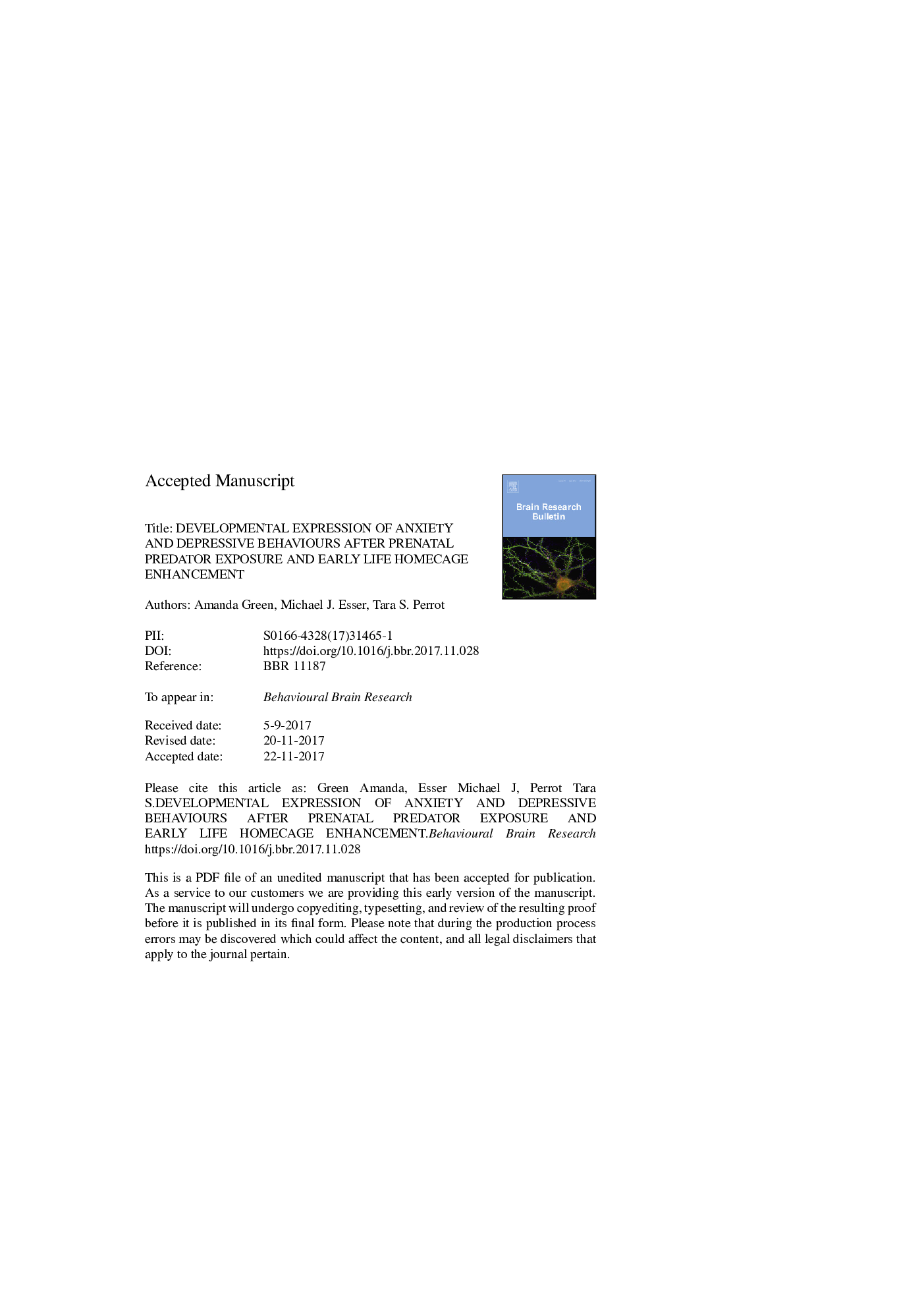| کد مقاله | کد نشریه | سال انتشار | مقاله انگلیسی | نسخه تمام متن |
|---|---|---|---|---|
| 8837838 | 1612889 | 2018 | 70 صفحه PDF | دانلود رایگان |
عنوان انگلیسی مقاله ISI
Developmental expression of anxiety and depressive behaviours after prenatal predator exposure and early life homecage enhancement
ترجمه فارسی عنوان
بیان رشد اضطراب و رفتارهای افسردگی پس از قرار گرفتن در معرض خطر شکنندگی زودرس و بهبود زایمان زودرس
دانلود مقاله + سفارش ترجمه
دانلود مقاله ISI انگلیسی
رایگان برای ایرانیان
کلمات کلیدی
Open field test - آزمایش میدان بازforced swim test - آزمون شناور اجباریPrenatal stress - استرس دوران بارداریAnxiety - اضطرابDepression - افسردگیAnhedonia - انهدونیاSucrose preference - اولویت ساکارزPredator odor - بوی شکارچیSex differences - تفاوت های جنسیتیSocial behaviour - رفتار اجتماعیEnriched environment - محیط غنی شده
موضوعات مرتبط
علوم زیستی و بیوفناوری
علم عصب شناسی
علوم اعصاب رفتاری
چکیده انگلیسی
Stressful events during gestation can have sex-specific effects on brain and behaviour, and may contribute to some of the differences observed in adult stress responding and psychopathology. We investigated the impact of a novel repeated prenatal psychological stress (prenatal predator exposure - PPS) during the last week of gestation in rats on offspring behaviours related to social interaction (play behaviour), open field test (OFT), forced swim test (FST) and sucrose preference test (SP) during the juvenile period and in adulthood. We further examined the role of postnatal environmental, using an enhanced housing condition (EHC), to prevent/rescue any changes. Some effects on anxiety, anhedonia, and stress-related coping behaviours (e.g., OFT, SP and OFT) did not emerge until adulthood. PPS increased OFT anxiety behaviours in adult males, and some OFT and SP behaviours in adult females. Contrary to this, EHC had few independent effects; most were apparent only when combined with PPS. In keeping with age-group differences, juvenile behaviours did not necessarily predict the same adult behaviours although juvenile OFT rearing and freezing, and juvenile FST immobility did predict adult FST immobility and sucrose preference, suggesting that some aspects of depressive behaviours may emerge early and predict adult vulnerability or coping behaviours. Together, these results suggest an important, though complex, role for early life psychological stressors and early life behaviours in creating an adult vulnerability to anxiety or depressive disorders and that environmental factors further modulate the effects of the prenatal stressors.
ناشر
Database: Elsevier - ScienceDirect (ساینس دایرکت)
Journal: Behavioural Brain Research - Volume 346, 2 July 2018, Pages 122-136
Journal: Behavioural Brain Research - Volume 346, 2 July 2018, Pages 122-136
نویسندگان
Amanda Green, Michael J. Esser, Tara S. Perrot,
